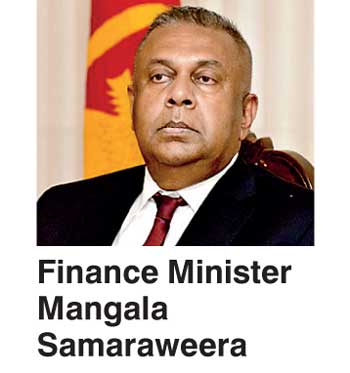Wednesday Feb 18, 2026
Wednesday Feb 18, 2026
Tuesday, 12 December 2017 00:54 - - {{hitsCtrl.values.hits}}
 By Ashwin Hemmathagama – Our Lobby Correspondent
By Ashwin Hemmathagama – Our Lobby Correspondent
Unable to cope with the increasing costs of natural disasters, the Government amended the Appropriation Act No. 24 of 2016 to increase the borrowing limit.
The Appropriation (Amendment) Bill was passed in Parliament with 53 voting in favour of it while eight voted against the amendment.
Moving the motion, Finance and Mass Media Minister Mangala Samaraweera said that the series of natural disasters the country faced during recent past had generated a heavy financial burden for the Government, forcing it to consider contingency plans.
“As the approved provisions of Budget 2017 may be insufficient to meet all payment obligations during the fiscal year 2017 it is necessary to mobilise additional funds by means of borrowing. Accordingly, it is required to increase the borrowing limit of Rs. 1,579.1 billion to Rs. 1,629 billion by amending Section 2 (b) of the Appropriation Act No. 24 of 2016, to increase the borrowing limit accordingly,” he added.
According to the Minister, the economy exhibited a mixed performance during the first nine months of this year, as growth in the industry and services sector improved. However, the adverse weather hindered progress in the agriculture sector.
“The economy grew at a rate of 3.9% in real terms during the first half of the year, compared to the same period of 2016, falling significantly below potential growth prospects. The drought and flood-related disturbances mainly affected agricultural activities which contributed negatively to overall growth and spilled over to other sectors of the economy as well. Domestic supply disruptions, tax revisions and the increased price of imported commodities caused consumer price inflation to remain at an elevated level in the year so far. In November, the Colombo Price Index rose to 7.6% and the growth of credit extended to the private sector decelerated gradually during the year as the monetary policy remained tight and less accommodating,” explained Minister Samaraweera.
He also noted the significant improvements in the physical sector in revenue collection as well as the Government’s primary balance during the first nine months of the year, along the path of the fiscal consolidation as supported by the IMF’s extended fund facility program.
“Nevertheless, the estimated revenue for 2017 may not be achieved during the year due to the delay in the introduction of the new Inland Revenue Act from 1 April 2018, and it dampened economic activity which weighed on the income tax and taxes on goods and services. Adverse weather events such as droughts and floods incur a significant fiscal cost in terms of immediate relief and expenditure allocations for disaster mitigation methods. The Government intends to spend more on disaster mitigation by extending the coverage to droughts as well so that more relief could be provided in the time ahead for all those affected by natural disasters.
“Further, measures are underway to formulate procedures to link up weather-related compensation to an index, which reflects the changing weather patterns so that Government support is extended to those in need in a more targeted manner. Further, the herd and debt service payments going to higher payments and rupee depreciation made a sizable impact on Government cashflow,” he added.